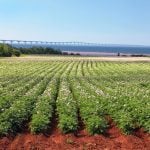Farmers have always been decision-makers. It’s been true throughout the generations. But there are three reasons why it’s different today.
The first is clear. It’s because of the number of zeroes in play. Farm decisions have always been make or break, but today’s dollar sums are beyond the imagining of farmers of only a few years ago.
More is at risk, and more people are at risk, because now, your financials have not only to sustain the farm but also to provide for a long, justifiably happy retirement for one and sometimes two generations, not to mention being fair to all the children on and off the farm.
Read Also

The Secret Sauce of Sibling Run Farms
Working with family can be difficult, but successful sibling agricultural operations seem to leverage the unique advantages of their relationships to create growth for their farms.
The second reason is less clear. It’s because agriculture is evolving far faster than seems possible from the roadside. You’ll see more about this in upcoming issues of Country Guide, but the differentials in farm financial performance are growing, not subsiding. And no, you can’t predict them based solely on who wins the yield trials, or who drives the sharpest pickup. Nor can you necessarily predict them based on farm size.
The result, however, is that while many of our farms are doing fine, at least in historic terms, a portion are thriving. They’re getting stronger and more ambitious with practically every month.
In such a context, I firmly believe, and I hope you believe too, there are opportunities for a wide variety of farm sizes and types, but the pressure to ensure that every decision is aligned in pursuit of the farm’s objectives is intense.
We cannot know exactly how farming will be different in 10 years time than it is today, but as I have said before, another of my core beliefs is that there is more energy and more capability in Canada’s farmers than there is opportunity.
Imagine if every Canadian farmer could farm all the acres or fill every barn with all the livestock they’re capable of raising.
This ties in with my third reason, which is the obvious point that decision-making on today’s farms is more complex, more technical and more integrated than ever before. This takes intelligence, of course, and it takes commitment, but more than anything it takes a different management strategy, one that prioritizes obtaining the best professional inputs as highly as the best agronomic choices.
In this context, summer is a crucial business season. I compare it to the way you use the winter to choose and buy your inputs, and to prep your machinery so you’re ready to take maximum advantage of every opportunity the spring gives you.
Summer is a great time to observe your people in action, to re-assess your objectives, to expand your networks, to view different types of farms, to consider new ways of working together as a family so you can hit the business ground running in the fall.
We have planned the diverse articles in our April 2019 issue of Country Guide to help. Are we getting it right? Let me know at [email protected].













